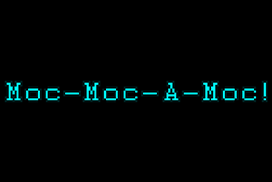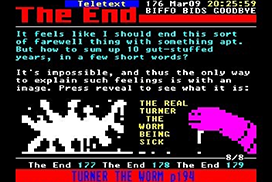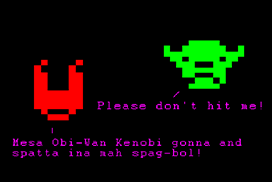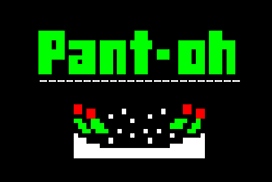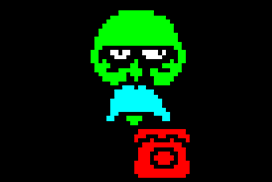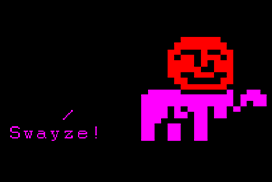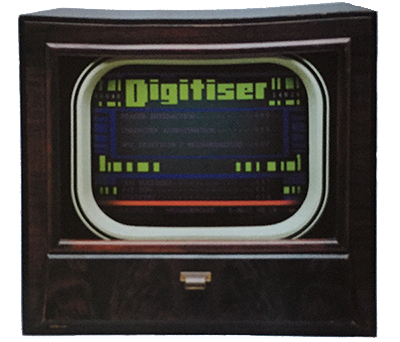
Long-running and well respected multi-format games magazine Edge had a good relationship with Digitiser over the years. When Digi reached its tenth anniversary in January 2003, the papery mag published a wonderful retrospective in tribute, where Mr Biffo gave full details of Digi's history, and of the troubles with Teletext management. The full article is reprinted here.

|
love-me-do
Begun as a response to Oracle's games page back in 1993, Digitiser has gone on to receive plaudits, ITC rebukes and photos of a fan's naked girlfriend. Edge talks to the mastermind behind it all, Paul Rose.
"About six years ago, I got a call from a guy at The Independent saying, 'I'd like to do a feature on you, because Digitiser is a phenomenon.' But he never called back", says Paul Rose, grinning into a half-full pint glass. "The reason he never called back was because his book had been picked up by a publisher. It was Alex Garland. After The Beach came out, he sent me a copy and said that if I turned to page such-and-such I'd see a tribute to Digitiser. One of the chapters is named after a Digi phrase, 'Messed Up'. And he opened my eyes to the fact that people who are into games know Digitiser."
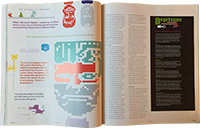
|
Paul Rose, aka Digitiser's Mr Biffo, grins a lot. He also laughs, and giggles, and sometimes shrugs with a c'est-la-vie smile. There is not a trace of cynicism in his words, which is surprising coming from one of the country's longest-standing games journalists; Digitiser is ten years old, and Rose has been writing it since the beginning. It is unlikely you'll have heard of him, although his nom de plume is significantly better known among gamers. As Mr Biffo says, people who are into games know Digitiser.
People like Alex Garland, bestselling author of The Beach and 28 Days Later, ("Probably Digitiser's biggest fan on Earth", says Rose) who once won a typically-'Digi' competition in which readers had to send a photograph of someone in an exotic location holding up a sign saying "Digitiser = Filth". The competition's title was Brown Trumpet; Alex Garland sent in a picture of one of his friends standing atop a temple in Thailand. History does not recall his prize, but the anecdote shows the sort of devotion that Channel 4's Teletext games page inspires, and that would ultimately rescue it from a management-led humour cull.
That comes later, though. The start, the very start, is in 1987, when Rose left school and got a job working for Ladbrokes as a graphic designer for its in-store materials. From there he moved to its teletext section, and then got a job working on the scoreboard at Wembley stadium, operating it during sporting events. Then one day in August 1992, a call came from the editor of Teletext, John Holt. Rose picks up the story.
"Teletext had just won the franchise from Oracle. John was looking for a designer, and someone had recommended me. Even back then teletext graphics were a dying art, and I've since gone on... I'm kind of like the Obi Wan Kenobi of teletext graphics, the last surviving Jedi. Anyway, I got the job at Teletext as a graphic designer."
During the run up to the launch of the service, Teletext put out an internal memo asking people for ideas for pages. Rose responded with a rough proposal for a games section. "They came back to me and said they were thinking of doing a games page, a single page - Oracle had a games page - and that it was going to be written by a guy called Tim Moore. They got us together and said 'Okay, we'll expand it into a magazine, but you've both got to write it together.' So I was asked to write Digitiser with Tim, with no journalistic experience whatsoever - just a two-month dry run before we went on air. And I had to do it alongside my graphic design chores."
Digitiser launched on January 1, 1993, and proved controversial from the start. An opening-day statement announced its intention to cover all console formats, and incited the wrath of Amiga owners by referring to it as a "dying format". Immediately, the angry letters began to flood in. It didn't affect Digitiser's decision - and there'd be many more fanboy campaigns to come - but it did show Rose and Moore that Digitiser had an immense audience, far exceeding that of even the biggest print magazine. All of a sudden, they had power. And a magazine to write, which wasn't easy.
"Neither of us had any idea how to go about reviewing games, or even where to get games from", Rose states, illustrating how they were thrown in the deep end. "We didn't even think of ringing up PR people and asking for review copies - we did a deal with a games importer who used to get our review copies in return for a credit at the bottom of the page. I think my first review was... God... Green Dog the Surfer Dude, on the Mega Drive. It was awful. I mean, I remember the review, and I wrote it in, well", he checks left and right for Dennis staff, "Sub-C&VG surfer speak; it was all like 'gnarly dude', and all that. And we were at a disadvantage with print magazines in that we didn't have screenshots, and that was pretty apparent from the off."
But while print mags could use game grabs, Digitiser's digital medium meant low lead times, and quicker information. More than that, the authors' freedom within their section meant they could compensate for the loss of press-kit imagery with nonsense jokes and pixel-graphic surrealism. The creators sparked off each other as soon as they met, and shared a sense of humour which would set the pattern for Digitiser's life so far; one that, as Rose puts it proudly, was "fairly stupid". And people started responding to it. "There were as many readers who read Digitiser for the humour as the games. We got letters that said, 'Stop the games stuff'". There's a pause. "Which we couldn't do, obviously.
"But I remember some fairly early stupid stuff we had on there. I got a call on a Saturday from one of the senior editorial team. I think we'd made some reference to someone playing on their Mega Drive, and an image of Noel Edmonds had emanated out of the top of it. She actually rang me up because she just wanted to double check that it was meant to be satire."
Then, one morning, Rose was reading The Sun on the toilet - too much detail, as it happens, but he remembers the moment very clearly - and turned over a page to see the headline "Teletext Rapped Over Sick Videogame Joke". Digitiser was less than a month old, and already heading for an encounter with the ITC.
Bad boys
"Tim made a reference to epilepsy in a news piece - 'This is the game you've all heard about, now you too can develop epilepsy'. And it had gone on air. Then we took a call from a gentleman from the British Epilepsy Association, and, well, as far as Tim was concerned, the matter had been resolved, and the reference had been removed. But the gentleman from the BEA decided to go to the ITC, and I think from that very early moment we got a reputation within the company as, well, troublemakers. We got a reputation for being bad boys, rulebreakers."
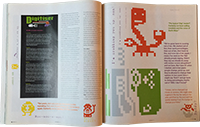
|
They weren't being bad. They were just trying to amuse themselves, and understanding that means you're closer to understanding what makes Digitiser, and what makes it divide people so clearly. Rose put it eloquently thus, "People don't get the jokes, and so don't get them because they don't make any sense, that it makes them angry. Literally makes them really cross, and confused and upset that they're not in on the jokes. It's like McCarthyism, or fascism, or human nature. You want to destroy what you don't understand."
The love/hate dichotomy was already forming, and the readers at both extremes started to get curious. "Fairly early on, we started to get letters from people wanting to know just who the hell we were. It's something that we felt kindred of spirit with Edge for, because you never plastered your magazine with photographs of yourselves, and never put your names to things, and we hated that whole attempt to make celebrities out of reviewers - it always got under my skin.
"Anyway, we wanted to respond to letters, and by this point we had another guy working for us called Adam Keeble. So there were three of us and, at the time, we were going through this phase of saying things were 'Corky the Cat', or 'Biffo the Bear, man', which I suppose is a precursor to The Snakes' style of speaking. So when we were seeking nom de plumes for ourselves, I ended up as Mr Biffo. Adam was Mr Cheese - because prior to working for 'Digi', he'd won one of our competitions using that pseudonym - and Tim, for whatever reason, called himself Mr Hairs. Of course, the irony of all this was that our attempt at anonymity completely backfired, and just fuelled the fire."
Digitiser's popularity snowballed into a million-strong cult, and Rose's writing improved immeasurably too, something that he ascribes to both the restrictions of writing within a 60-word-per-page limit, and to Moore's influence. Moore had been a journalist for years before joining Teletext, and Rose claims the best period in Digitiser's life was just before he left. "I owe a massive debt to him", he says. "We worked so close together for such a long time, and he taught me to write. And I'm now the most anal person when it comes to grammar and spelling". The quickfire turnaround for generating copy wasn't without its problems, though.
"I think part of the problem with 'Digi is that it's daily, and I've kind of forgotten what I've written from one day to the next. With that turnover I'll sometimes say something, and by the time I'm regretting putting something on the air, it's on the air". And we're back to being misunderstood again. "The thing is, everything in 'Digi' is done tongue in cheek. I have this reputation that is so unjust, that's of being slightly embittered and full of spite and venom, and that's about as far removed from me as you can possibly get. Any time 'Digi' does get like that, with Fat Sow and so on, it's always tongue in cheek, and I'm shrugging my shoulders, not caring enough to really get annoyed about anything. That's just me."
The office
Teletext's upper management, on the other hand, weren't shrugging their shoulders. Despite excellent viewing figures and proportionate advertising income, Rose was aware of an anti-'Digi' movement running through the company. "Oh, completely. I know when a new sub-editor started, they were always told to keep an eye on us", he sighs, like someone who's grown to accept that he'll always be misrepresented. "And this story is why I'll never work in an office again, these kinds of days. It was a team-building day out, and we had to all sit round and say what the first thing we'd do if Prince Charles was killed in a skiing accident. And someone said 'Well, I'd check Digitiser to make sure they didn't have any sick jokes about skiing', in all seriousness. And everyone else was sat round agreeing with them. And I was like, 'Give me some credit!'"
In September of last year, the unpleasantness came to a head in what Rose refers to as 'Digigate'. Teletext executives issued instructions that Digitiser's defining humour was to stop. Edge wonders if Mr Biffo saw it coming?
"I felt it had been coming for ten years. Completely. I've always been astonished that, well, Christ, it's lasted ten years, and that's a hell of an achievement. But I was aware we had this reputation, and that people didn't particularly like us - particularly over the last five years, when I've not been based at Teletext, and I was just the person sending in copy that they didn't think was funny. It annoyed them. It spoke in a language they didn't understand - and of course they didn't understand it, because it wasn't aimed at them, because they were media executives and Digitiser was aimed at videogames fans. To their credit, they've understood that now, and they know that Digitiser works."
At the time, though, things were different. Rose speaks deliberately, carefully watching his words. "The excuse I was given is that is was a cost-cutting measure. But in the process of that decision, when I was told that Digitiser was being reduced to three days a week, albeit with no reduction in copy, I was also told that they didn't think it was funny, and that it had to stop being funny. Or stop being not funny. I had no choice but to go along with it."
Panel beaters
So out went the jokes; Ring-Sir!, Zombie Dave, Fat Sow, et al; and out went Panel 4, too, Digitiser's weekly column by a guest games expert. Rose wasn't quite as sad to see that disappear. "I was so sorry to see Stuart Campbell go. I think the other columnists weren't giving it their full attention. I think Violet Berlin would be the first to admit that". Not that it didn't cause some pain, thanks to Campbell's final column, never actually published. Rose grimaces a little, though the smile doesn't disappear completely.
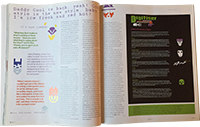
|
"I can see what he was doing, and Stuart won't like me saying this, but that, in the middle of it all. Things got really horrible, it was really quite unpleasant. Teletext have said to me, 'We handled it really badly', and they did, they were needlessly nasty to me, unpleasant and confrontational, and they've apologised and that's fine. And, then, in the middle of that, Stuart sent in this Panel 4 that bloody well made everything worse". He grins. "I'm like, 'Cheers Stuart, I'm trying to pour water on the flames, and you've just chucked a can of petrol in.'" While Campbell's rant was unpublished, it can be read in full on the internet at http://worldofstuart.excellentcontent.com/world/digi/digi72.htm
While Digitiser went through the motions for a year, losing its cult status and losing viewers, Rose was busy elsewhere, writing for Sooty and My Parents Are Aliens for CITV, bringing Bubblegun strip Knife & Wife to Channel 3 ("It was shite. I don't mind saying that. Even though it had the most amazing cast, my script wasn't up to standard. That said, it almost got commissioned"), and producing a story for Zed Two's promising Pillage. On the other hand, passionate Digitiser fans were busy organising and executing a war of attrition against the Teletext bosses, demanding the return of editorial control to Mr Biffo.
"It's only been in the last year, since Digigate, that I've actually understood Digitiser's popularity", says Rose. "For a long time I've worked from home. I went freelance five years ago, and I'm based at home in my little cocoon - all the post goes to Teletext, so do the emails. But I did get to see a percentage of the letters that went there after the changes. And on top of that, the sheer volume of personal emails I got to my home address. I started to understand, for the first time in nine years that, hang on, this is actually quite popular, isn't it?"
Eventually, Teletext went back on its original decision, and the character - but not the characters, at least not just yet - returned to Digitiser. "The justification that Teletext gave me last year when they said I'd got to stop the funny stuff was that it excludes people. I would argue that it was the exact opposite. They said this 'Pythonesque' - their word not mine - humour alienates and excludes people. I think the subsequent letter writing campaign proved that more people felt part of the clique than not."
The future of the section looks even brighter. "There's talk of properly relaunching the website next summer. Properly, this time, with reviews, an updated daily service, and so on. Whether it'll work... I mean, we're not going to have the pixellated graphics on there. But I dunno, the web, digital teletext is in its infancy... I mean, it's funny, but I've never felt the destiny of Digitiser's in my hands. It's up to Teletext if they want to keep going with it, and for the first time in ten years they're fully behind it. We've always been this bad boy, Teletext's dirty secret, but now they want to integrate us."
And while Rose gets ever busier - he's currently writing for Crossroads, hoping to do the same for EastEnders, and developing "a proper grown-up comedy drama" for Granada - he doesn't appear to have any intention of leaving Teletext and his Jedi pixel skills behind. "It's funny. If I was going to quit 'Digi', I think I'd have done it last year. I do it now because I love it. That said, there wasn't a lot of love going into it over the last year - but hey, there wasn't a lot of love going both ways between myself and Teletext. But that's changed, and for the tenth anniversary I'm allowed to restore to some dignity to the pages, get some humour and a little character back in there."
No fatal royal skiing accidents, then? "I'm a mature adult", smirks Rose. "I know when something's appropriate and when something isn't. Ten years on, and we've never offended anyone. Um, apart from that one man, about epilepsy". And a couple of others, but who's counting? Besides, "I've never gone out of my way to cause trouble. My attitude is to keep my head low down in the trenches, dodge as many bullets as possible, keep in the shadows".
But, for all his pretentions to shyness, Rose - or his alter-ego, at least - is vocal about games. Biffo on hardcore gamers: "It's a fundamental problem in the hardcore games-playing community that they don't see that you're allowed to change your opinion on something". Biffo on Star Fox Adventures: "It's got an ice level, it's got a lava level, and it's got barrels that roll down a hill. The reason it has them is because, hey, games have those". Biffo on Blinx: "I wish I'd laid into it a bit more. Partly because Xbox owners are pissing me off, and partly because I was just too lenient on it. It's offensive".
"Ah, got to love those fanboys. "At the moment the Xbox owners are raging at us. I had a look at the 'Official Xbox Magazine' forums a couple of months ago, and they're all moaning about Digitiser, trying to organise a letter-writing campaign to get us taken off the air. You wouldn't believe the number of campaigns there've been to have Digitiser taken off the air: there's been Dreamcast owners, Amiga owners, PC owners, and it's like", Mr Biffo pauses and grins at an imaginary audience of h8rs, "we're still here, boys". Sure. Edge wouldn't have it any other way.
Just as Edge went to press Paul Rose contacted the magazine to announce his departure from Teletext, something which had been brewing for a while. He had this to say on the subject: "What with the tenth anniversary looming, Teletext's admission that it made a mistake a year ago by canning the humour, thereby allowing me to restore some dignity to the pages, the Edge feature, and the fact that I've just been offered a writing gig on EastEnders and a Channel 4 sitcom - the planets seemed to be in alignment. The time was right". His input into Digitiser will be sadly missed.
Mr Biffo on why Digitiser's so misunderstood
"Fairly early on we put a few noses out of joint, never intentionally; we really enjoyed what we were doing and I think that came across on the page. But I also think the fact that we enjoyed ourselves, that we messed about in the office something rotten, kind of rubbed people up the wrong way. And even the management at Teletext now is a completely different bunch of people, somehow this troublemaker reputation endured."
Wiped out
"We've always had trouble getting games from PR people. Now it's better, because we've got a guy called Gavin Lambert who does the tips, charts, and letters, and he's based at Teletext and he's great at chasing up games. But PR people have always distrusted us, generally speaking. Anyway, IWipeoutI came out, biggest game yet on the PlayStation, and we went through hell trying to get it. Calls weren't being answered, emails were being ignored. So we did the only thing left open to us; get Fat Sow to put out a request for it on air. Unfortunately, we went a little bit too far, and... um, yes, there was some... trouble."
Dog bollocks
"Gossi The Dog. ITC's only complaint, except for the epilepsy thing. Gossi The Dog had a complaint upheld from the RSPCA, complaining - and it was a misunderstood reference, it wasn't what it said at all - that there was a reference to a dog being beaten with a belt. A cartoon dog, called Gossi, who does the news."
Handbags at dawn
"Steve Starvis at Eidos is a funny one. Always slightly nervy. I remember one ECTS a couple of years ago, something in the write-up of the previous show had obviously bothered him. He approached me and told me he'd got a better bag this year. I hadn't remembered, but apparently I'd made some reference to him having a girl's handbag on air, and he'd held a grudge for a year."
Booby juice
"Yesterday I had to question a decision to remove the phrase 'rancid tramp'. I mean, I've written for a kids' show called 'My Parents Are Aliens', which is on at 4.30pm on ITV. One episode of the show featured the phrase 'booby juice'. The father had grown a pair of breasts and was feeding his children breast milk for breakfast. I'm pretty sure that if CITV can have that on at 4.30 in the afternoon, I can get the phrase 'rancid tramp' in Digitiser without the ITC coming down on us."
Meanie machines
"'Mean Machines' started putting digs at 'Digi' in their letters pages, and we started digging back. But of course, we could dig harder and faster and every single day. It eventually ended when editor Steve Merrett... well, there was one specific challenge he put to us, something about viewing figures. We sent him this absurd letter back, where we called him biscuit-skin, fish-back, and all these other things, along with the statistics that proved our point. And in the next issue of 'Mean Machines' there was some briefly worded retraction, and that was the end of that."
Mr Biffo on reader interaction
Incentives
"At one point we got hold a bunch of signed photos - a stack, about a foot high - of ITV weathergirls, and we gave them away to every letter writer for about three months. They had a choice as well, they had to request Sian Lloyd or whatever. In the early days we had this guy who... this is terrible actually. I probably shouldn't tell you this. But no, he used to send us naked polaroids of his girlfriend. And we used to send him stuff back. And he'd send us more. We'd send him free games. Um. Yeah. They were great! Proper Polaroids! Fantastic!"
Regulars
"Stuart N Hardy wrote to us, but then he wrote to every games mag and every other publication in the country. We had a girl called Poppy who used to send us lovely perfume-scented letters. Oh, and there was The Girl With Golden Game Boy. Danny Boyd, Luton Area was the only letter writer we ever made up. He was a precursor to Fat Sow. Although we always got an immense amount of mail, it was always the same kind of letters, so I started writing under the pseudonym, sending inflammatory letters that'd piss people off, and then we'd get thousands of letters in response."
Stalkers
"There was one reader we had to call the police about [Dantendo]. It started out with him sending photos of himself in a department store with his trousrs round his ankles. That was for one of the competitions, Brown Trumpet [II] - 'Digitiser Destroyed Me' - so fair enough, he was getting into the spirit of the thing. He'd write to us a lot anyway, but slowly the frequency increased, until we were getting letters from him every day. The letters started out about games. Eventually they stopped being about games. And then they started to cover both sides of the paper, no start or finish, and they'd rant a lot about how we were putting up subliminal messages accusing him of being gay. Then he started writing on the outside of the letter - he wouldn't put stamps on, just wrote Freepost, even though it wasn't, and it always got to us - and then one day he started sending us shit. Oh, and death threats."
Celebrities
"Peter Serafinowicz, voice of Darth Maul. He's Digitiser's second biggest fan. Alex Garland described me as a Matthew Smith figure. We were going to have interviews with celebrity gamers, right at the very beginning. The only one we ever got was some bloke from Carter USM. Oh, and, God, we got Gary Glitter as well. I don't know if we ever ran it though - it was all one word responses."
Mr Biffo on the characters of Digitiser
"It's difficult to talk about any of the characters without incriminating myself, because I always felt that part of the reason why I found them funny is because they have no place in being there. And we got away with it until last September, which fair dues to Teletext, came down to them saying, "Why the hell is this half elephant man on here telling jokes that make no sense?"
The Man
"We started with The Man With A Long Chin, who was originally called The Man With A Long Chin Wearing A Pink Beret, which was just stupid, and was eventually just shortened to The Man. You work for a games magazine, you get sent freebies and stuff, which eventually start to clutter up the office. So we wanted to find a way to give it away, rather than hoard it at home, and I think I drew this graphic on a page for a competition of a man in a pink beret, and people would win something from his secret pocket. And then at some point that evolved into The Man's Diary. I honestly can't tell you how that link was made."
The Man's Daddy
"The Man's Daddy is without a doubt my favourite. It never, IeverI made any sense. In fact - and this is probably true of Digitiser of a whole, and probably the reason why we've had a few run-ins with various people over the years - you literally love it or hate it. It's such an extreme of hate, such an extreme of love. And there were even those extremes within the organisation that airs Digitiser. People who loved it, people who absolutely hated it. The levels of vitriol we've had in letters over the years, and the levels of love - IgenuineI love."
The Snakes
"The Snakes were another of my favourites, and Fox ended up making a pilot for a TV version. The Snakes made it onto Bubblegun, which is where Fox Kids picked it up. It was for interstitials, and it had 'I cuss you bad' on there and everything. They did it with sock puppets, with Phil Cornwell doing the voices."
Fat Sow
"Fat Sow was a way to be anonymous. One thing that always wound us up about games mags was that they weren't opinionated - they never gave opinions, it was always very carefully worded so as not to offend their friends the PR people. We had to provide an alternative, because at the time, there wasn't an Edge, and there wasn't an Internet. We didn't mind speaking our minds, and we were honest, and because we weren't getting games from PR we didn't owe anyone favours. And we always used to have that disclaimer at the bottom 'Fat Sow's views do not necessarily coincide with Digitiser's and so on."
Zombie Dave
"Zombie Dave. <pause> What? <laughter> How did I get away with it? <laughter> I think the easiest answer is, well, we didn't get away with it, did we? Because they pulled the humour. I don't think they got... specific jokes... but I think they knew there was something going on underneath the surface. I still maintain that Zombie Dave never said anything rude, anyway."
Cyber-X
"I might bring him back. It goes back to the whole faces in magazines things. There was one specific journalist... in his magazine, a games magazine for God's sake, he had a diary section - a photo journal of him going out clubbing. And it was like 'hello?!' I mean, I'm a fine one to talk - I have swearing zombies and furious pigs on my pages, and a half elephant man who tells nonsense jokes but still, it just seems too self-indulgent. That Dave Perry school of thinking - no self awareness. I did an article on types of games journalists, actually. Future journalists all looked exactly the same - all had little round glasses, all really tall. All of them. And all Emap journalists were of a type too - lairy, ill-educated barrow boys."
Quote-him-do:
"When I talk about Digitiser, I always say we. Which I think is some way of distancing myself from it, this anonymity thing. Always done it. Weirdest thing."
"Don't like the new redesigns. Don't mind saying that, but it's nothing to do with me."
"It's one of my biggest bugbears with games that stories are written by developers that don't understand how to write a story. I mean, today I was playing Star Fox Adventures, and it was like, 'What's this about?! It's just a load of old bollocks.' There's no structure to it."
"I do think the medium's unfulfilled, and that there's so much more that can be done with games."
"Ten years, and you just see the same cycles repeating. I've seen trends come, go, come back again. Currently we're pissing off Xbox owners."
"The typical 'Digi' reader? Certainly not best-selling novellists and the voice of Darth Maul."
"I mean, we've changed our minds on reviews. We might stick a game in the top ten early in the year, and then by the end we'll be quietly leaving it out. It's human to change your mind."
"What they don't realise is they're posting on these forums - 'Have you see what they're saying about the Xbox?' and it's like, 'Thanks, you've given us an extra 20 viewers!"
"John [Pickford, of Zed Two] called my bluff. Knowing that I'd had experience of screenwriting and supposedly knew how a story should be structured, and knowing my opinion on game plots, he dropped me an email, and asked me if I fancied writing for his next game."
"When I started doing it, I couldn't get out of the mindset of writing a videogames script. So all the dialogue was incredibly stagey, and it read like a videogame. It was John who pulled me away from that and said, 'This is actually a bit shit', and then I started writing it like a proper script."
Do you know of any important moments from the annals of Digi history that have been omitted? If so, then mail me (superpage58@gmail.com) right now, man. Credit will be duly given for anything that gets put up.






